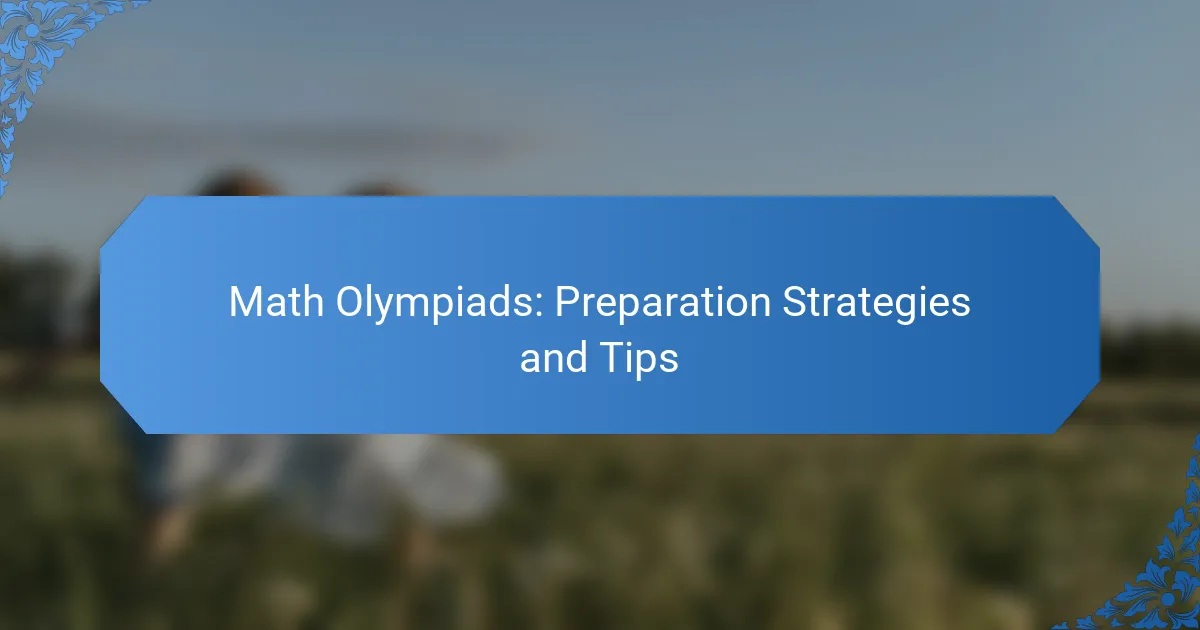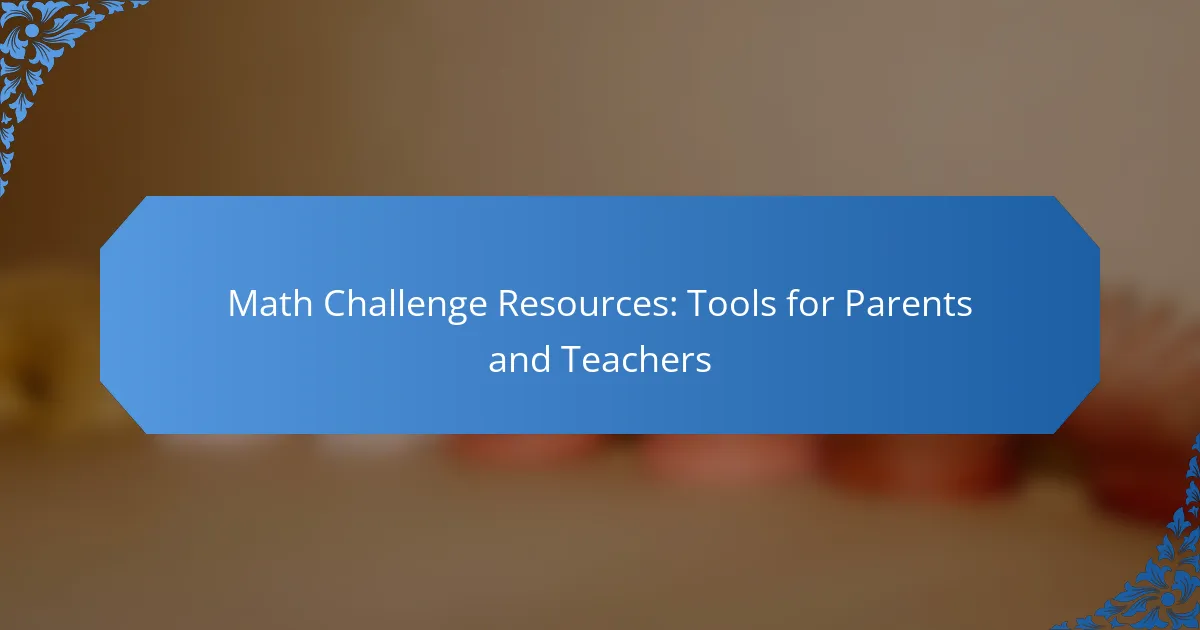Math competitions offer elementary students a unique opportunity to enhance their problem-solving skills while fostering a love for mathematics. Popular events such as MATHCOUNTS, Math Olympiad, and AMC 8 engage students in a fun and challenging environment, promoting both academic and personal growth. Participation typically involves meeting eligibility criteria and preparing with appropriate materials, making these competitions exciting for young learners.

What Are the Most Popular Math Competitions for Elementary Students?
Elementary students can participate in various math competitions that enhance their problem-solving skills and foster a love for mathematics. Some of the most popular events include MATHCOUNTS, Math Olympiad, Math League, AMC 8, and the Continental Mathematics League.
MATHCOUNTS
MATHCOUNTS is a national competition aimed at middle school students, but many elementary students also participate in local chapters. It features a series of challenging problems that test students’ mathematical reasoning and problem-solving abilities.
Students compete in both individual and team events, with the competition structured around different rounds, including sprint and target rounds. Preparing for MATHCOUNTS often involves practicing with past problems and engaging in math clubs or study groups.
Math Olympiad
The Math Olympiad is an international competition that encourages students to think creatively and solve complex problems. While primarily aimed at older students, many elementary students are encouraged to participate in local or regional events.
Participants tackle a series of challenging problems that require not just computation but also logical reasoning and innovative thinking. Schools often organize preparation sessions to help students familiarize themselves with the types of questions they may encounter.
Math League
The Math League offers competitions for students from elementary through high school, making it accessible for younger participants. The events consist of various rounds that test different mathematical skills, including algebra, geometry, and number theory.
Students can participate individually or as part of a team, and the league often provides practice materials to help students prepare. Engaging in Math League competitions can enhance teamwork and collaborative problem-solving skills among participants.
AMC 8
The AMC 8 is a 25-question, multiple-choice exam designed for students in grades 8 and below, making it suitable for advanced elementary students. It focuses on problem-solving and critical thinking rather than advanced mathematics.
Students have 40 minutes to complete the exam, which covers a range of topics, including arithmetic, geometry, and basic algebra. Schools often host AMC 8 events, and preparation can include practice tests and math enrichment programs.
Continental Mathematics League
The Continental Mathematics League (CML) provides a series of competitions for elementary and middle school students, focusing on problem-solving and mathematical reasoning. The CML consists of several contests throughout the school year, allowing students to compete regularly.
Each contest features a set of problems that challenge students’ understanding of various math concepts. Schools typically register for the league, and students can benefit from collaborative study sessions to enhance their skills and confidence before each competition.
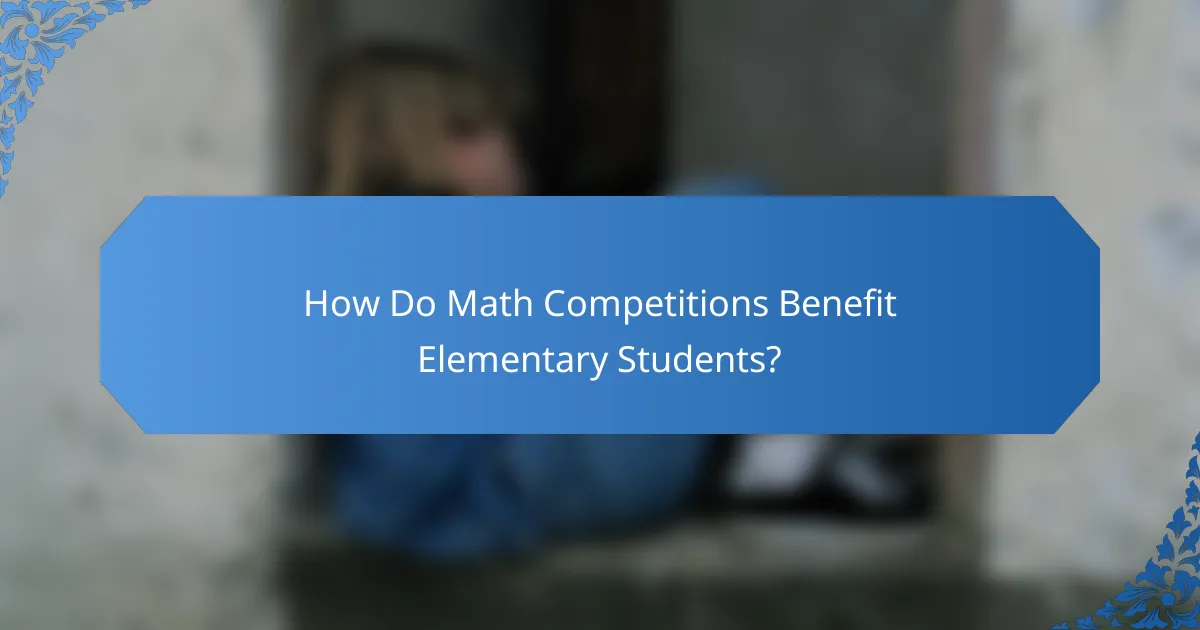
How Do Math Competitions Benefit Elementary Students?
Math competitions provide elementary students with opportunities to enhance their mathematical abilities, develop critical thinking, and foster a love for learning. These events encourage engagement with math in a fun and challenging environment, leading to both academic and personal growth.
Enhances problem-solving skills
Participating in math competitions helps students improve their problem-solving skills by exposing them to a variety of mathematical challenges. These events often present unique problems that require creative thinking and different approaches, pushing students to think outside the box.
For example, students might encounter puzzles that involve logic, patterns, or spatial reasoning. Regular participation can lead to improved analytical skills, which are beneficial not only in math but across all subjects.
Boosts confidence in math
Competing in math contests can significantly boost students’ confidence in their mathematical abilities. As they tackle challenging problems and achieve success, they develop a sense of accomplishment that translates into greater self-esteem.
Students who excel in competitions often find themselves more willing to participate in class discussions and tackle difficult math concepts. This newfound confidence can lead to a positive attitude toward math in general, encouraging lifelong learning.
Encourages teamwork
Many math competitions involve team events, which foster collaboration among students. Working together to solve problems helps students learn to communicate effectively and share different strategies, enhancing their overall understanding of math.
Team competitions teach valuable social skills, such as compromise and leadership, as students must navigate differing opinions and approaches. This collaborative environment not only strengthens their math skills but also builds friendships and a sense of community.
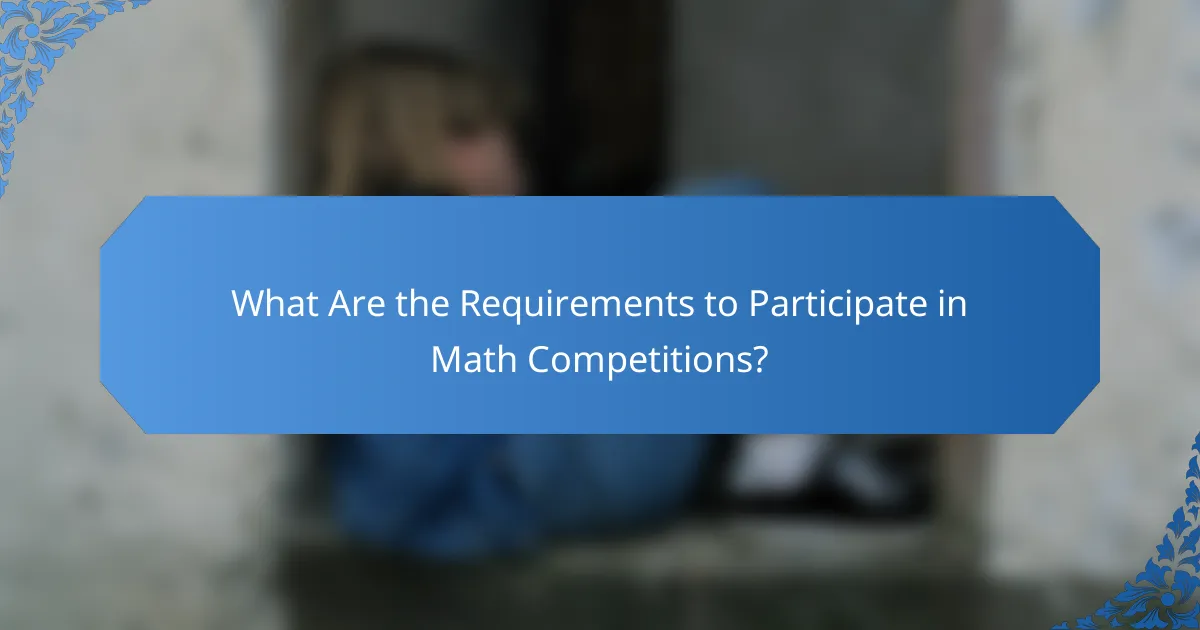
What Are the Requirements to Participate in Math Competitions?
To participate in math competitions, students typically need to meet specific eligibility criteria, complete a registration process, and prepare using appropriate materials. These competitions often cater to elementary students, focusing on problem-solving skills and mathematical reasoning.
Grade level eligibility
Most math competitions for elementary students are designed for specific grade levels, usually ranging from grades 3 to 6. Some events may allow younger students to participate, while others may have restrictions based on age or grade to ensure a fair competition.
Check the competition’s official guidelines to confirm the exact eligibility requirements, as they can vary significantly between events. For example, some competitions may have separate categories for different grades to accommodate varying skill levels.
Registration process
The registration process for math competitions generally involves filling out an application form and paying a registration fee. Fees can vary, typically ranging from $10 to $50, depending on the competition’s scale and location.
Many competitions offer online registration, making it convenient for parents and teachers to enroll students. It’s crucial to register before the deadline, which is often several weeks before the event date, to secure a spot.
Preparation materials
Preparation for math competitions can include a variety of resources such as workbooks, online practice tests, and past competition papers. Many organizations provide sample problems and guidelines to help students understand the format and types of questions they may encounter.
Parents and educators should encourage students to practice regularly, focusing on problem-solving strategies and time management. Joining a math club or attending workshops can also enhance preparation and provide valuable experience before the competition.
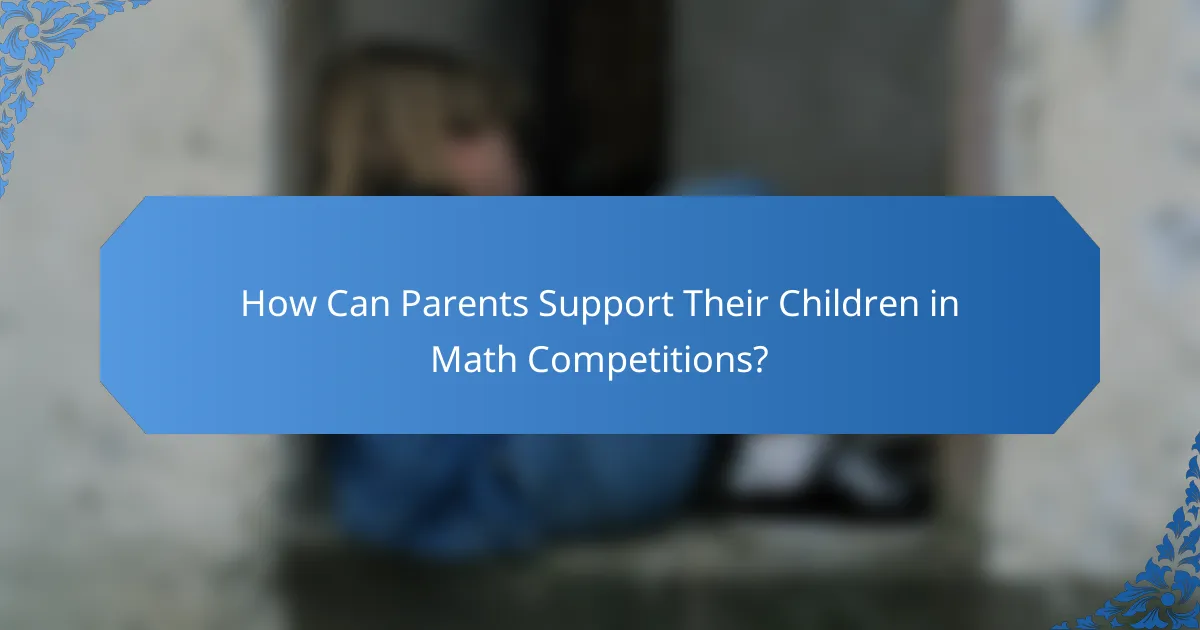
How Can Parents Support Their Children in Math Competitions?
Parents can play a crucial role in supporting their children during math competitions by providing the right resources, encouraging consistent practice, and facilitating attendance at relevant workshops. These strategies help build confidence and improve problem-solving skills essential for success.
Provide study resources
Offering a variety of study resources can significantly enhance a child’s preparation for math competitions. Books, online courses, and practice tests tailored for elementary-level competitions are excellent starting points. Look for resources that align with popular competitions like Math Olympiads or the American Mathematics Competitions (AMC).
Consider utilizing websites that provide interactive math games and problem-solving challenges. These platforms can make learning engaging and help students grasp complex concepts in a fun way.
Encourage practice sessions
Regular practice sessions are vital for building math skills and boosting confidence. Set aside dedicated time each week for your child to work on math problems, focusing on both speed and accuracy. Aim for short, focused sessions of about 30 to 60 minutes to maintain engagement without causing fatigue.
Incorporate a mix of problem types, including logic puzzles and word problems, to develop a well-rounded skill set. Tracking progress can also motivate children; consider using a simple chart to mark completed problems or concepts mastered.
Attend workshops
Participating in math workshops can provide children with valuable insights and strategies for competitions. Look for local or online workshops specifically designed for elementary students, often hosted by schools or math clubs. These sessions typically cover problem-solving techniques and offer practice opportunities.
Encourage your child to ask questions during workshops and engage with peers. This interaction can foster a supportive learning environment and help them learn different approaches to solving math problems.
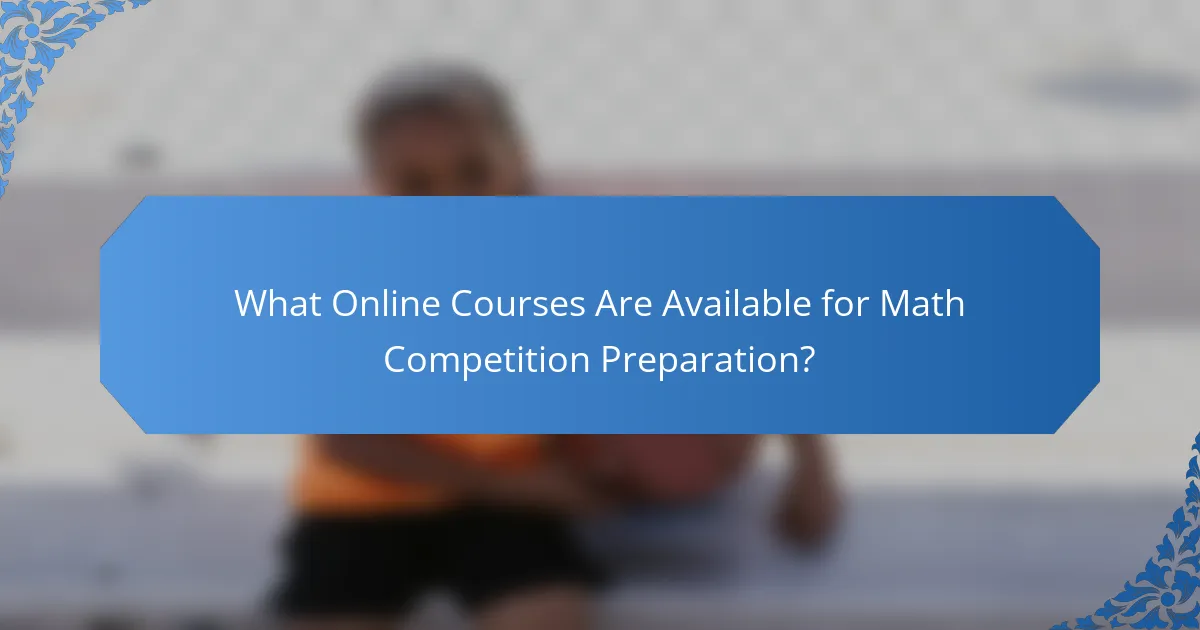
What Online Courses Are Available for Math Competition Preparation?
Several online courses cater to elementary students preparing for math competitions, focusing on problem-solving skills and advanced mathematical concepts. These courses vary in structure, content, and teaching methods, allowing students to choose based on their learning preferences and competition goals.
Art of Problem Solving courses
The Art of Problem Solving (AoPS) offers a range of online courses specifically designed for students interested in math competitions. Their curriculum emphasizes deep understanding and problem-solving techniques, making it suitable for students aiming for high-level contests like Math Olympiads.
Courses are typically structured with interactive lessons, problem sets, and forums for discussion. Students can expect to engage in rigorous practice, often requiring several hours per week to keep pace with the material.
Brilliant.org math courses
Brilliant.org provides interactive math courses that focus on problem-solving and critical thinking. Their platform is user-friendly, featuring engaging visuals and real-world applications that help students grasp complex concepts more easily.
Courses are self-paced, allowing students to progress according to their schedules. This flexibility is beneficial for young learners who may have varying levels of commitment or time availability for math competition preparation.
Mathnasium tutoring programs
Mathnasium offers personalized tutoring programs that can help students prepare for math competitions. Their approach focuses on building foundational skills while also introducing advanced topics relevant to competitive math.
Sessions are typically one-on-one, allowing tutors to tailor lessons to each student’s needs. Parents can expect to see improvements in their child’s confidence and problem-solving abilities, which are crucial for success in competitions.
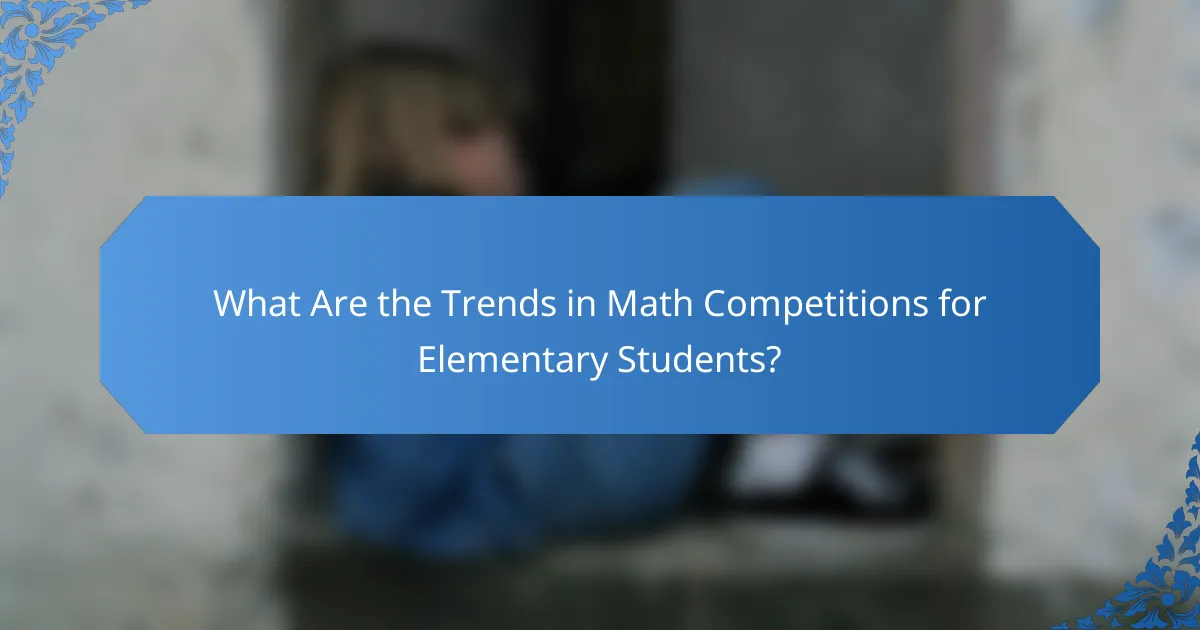
What Are the Trends in Math Competitions for Elementary Students?
Math competitions for elementary students are increasingly popular, focusing on enhancing problem-solving skills and fostering a love for mathematics. These events often emphasize collaboration, creativity, and critical thinking, appealing to a broad range of young learners.
Types of Math Competitions
Elementary math competitions come in various formats, including individual contests, team challenges, and online competitions. Popular events like Math Olympiads and MathCounts encourage students to tackle complex problems in a timed setting, while local school competitions may focus on basic arithmetic and logic puzzles.
Some competitions are designed to be fun and engaging, such as Math Jeopardy or Math Relay races, where students work together to solve problems. These formats help to build teamwork and communication skills alongside mathematical understanding.
Benefits of Participation
Participating in math competitions can significantly boost students’ confidence and interest in mathematics. Engaging in these events helps develop critical thinking and problem-solving abilities, which are essential skills in academic and real-world scenarios.
Competitions also provide opportunities for students to meet peers with similar interests, fostering a sense of community and collaboration. Additionally, many competitions offer awards and recognition, motivating students to excel and pursue further studies in mathematics.
How to Prepare for Math Competitions
Preparation for math competitions typically involves practicing problem-solving techniques and familiarizing oneself with the competition format. Students should work on a variety of math topics, including geometry, algebra, and number theory, to build a well-rounded skill set.
Joining a math club or participating in training sessions can provide structured guidance and support. Parents can also help by encouraging regular practice and providing resources such as workbooks or online platforms that offer practice problems and mock competitions.
Common Challenges
One common challenge in math competitions is time management, as students often have limited time to solve problems. Practicing under timed conditions can help students learn to pace themselves effectively during the actual competition.
Additionally, students may feel pressure to perform well, which can lead to anxiety. Encouraging a growth mindset and emphasizing the learning experience over winning can help alleviate some of this stress.

